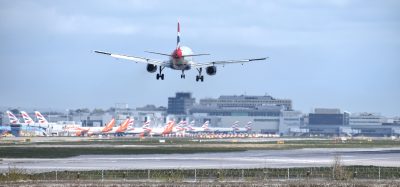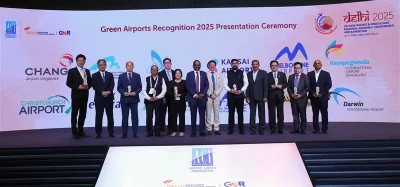Bridging the gender diversity gap within the aviation industry
- Like
- Digg
- Del
- Tumblr
- VKontakte
- Buffer
- Love This
- Odnoklassniki
- Meneame
- Blogger
- Amazon
- Yahoo Mail
- Gmail
- AOL
- Newsvine
- HackerNews
- Evernote
- MySpace
- Mail.ru
- Viadeo
- Line
- Comments
- Yummly
- SMS
- Viber
- Telegram
- Subscribe
- Skype
- Facebook Messenger
- Kakao
- LiveJournal
- Yammer
- Edgar
- Fintel
- Mix
- Instapaper
- Copy Link
Posted: 14 June 2021 | Chhatrapati Shivaji Maharaj International Airport (BOM) | No comments yet
Chhatrapati Shivaji Maharaj International Airport prides itself on its approach to gender diversity and human rights advocacy. For International Airport Review, the airport discusses the ways in which it works to deliver gender equality within its workforce and how its policies prevent any kind of discrimination.


The aviation industry has been continuously striving to bridge the gap in gender diversity, working to overcome the stereotype of air hostess versus pilots. Over the years, various aviation bodies have put forth programmes to encourage and promote the role of women in all aspects of aviation, including in technical and management areas. Compared to the aviation market in other countries, India emerged as the leading country, with approximately 12.4 per cent of Indian pilots being female in 2020.
BOM believes in driving a culture for passion and excellence through teamwork, integrity and high performance”
Chhatrapati Shivaji Maharaj International Airport (BOM) considers diversity as a key focus, as it brings together different perspectives that can help businesses to stay profitable in a highly competitive environment, such as the aviation industry, as well as signalling an attractive work environment for prospective new talents. Attributing its success to the role of its employees, BOM believes in driving a culture for passion and excellence through teamwork, integrity and high performance; the airport places special emphasis on its efforts to identify and nurture the right talent and thereby ensuring an inclusive growth. The airport leaves no stone unturned in its efforts regarding gender equality, inclusion and diversity; training and development; employee engagement; and caring for employees’ health and safety.
Gender equality is a fundamental human right and, as part of its Sustainable Development Goals (SDGs), Chhatrapati Shivaji Maharaj International Airport is committed to encouraging gender parity, empowering women and promoting the ascendancy of women leaders. The airport strongly believes that empowering women in the workplace can bring a relay of positives to the business, and BOM has taken concerted efforts to improve the representation of women in its total workforce and leadership roles, including within its Board of Directors.
Chhatrapati Shivaji Maharaj International Airport is also a proud propagator of equal opportunities and maintains a remuneration ratio of 1:1 for men and women”
Chhatrapati Shivaji Maharaj International Airport is also a proud propagator of equal opportunities and maintains a remuneration ratio of 1:1 for men and women. At the airport, performance plays a far more vital role than the person’s gender, caste, creed, disability or nationality in terms of remuneration and opportunities. Highlighting the importance of pay parity, BOM does not entertain discrimination in work and pay and is compliant to all statutory and regulatory norms. The airport doesn’t discriminate or bias towards payment of entry-level wages and benefits. In order to facilitate these ideologies, BOM has formulated a strict remuneration policy for Executive Directors, Key Managerial Personnel (KMP) and other employees, which is a testimony to its philosophy.
Furthermore, Chhatrapati Shivaji Maharaj International Airport has a systematic approach towards training its resources to create an environment of continuous learning that provides its employees with opportunities to develop and discover their capabilities. Between 2018 and 2020, the airport registered an average gender-wise training time of 78.79 hours for men and 71.08 hours for women, as compared to 70.91 and 58.48 respectively between 2016 and 2018.
The airport also places a great emphasis on the protection of human rights. It fosters a positive work environment free from harassment of any nature”
The airport also places a great emphasis on the protection of human rights. It fosters a positive work environment free from harassment of any nature, as Chhatrapati Shivaji Maharaj International Airport has institutionalised a policy on the prevention, prohibition and redressal of sexual harassment at the workplace. Following a rigorous gender-neutral approach in handling complaints of sexual harassment – which applies to all of its permanent, temporary and contractual employees, including those of service providers – BOM has set-up a five-member Internal Complaints Committee, which consists of three women.
In line with the airport’s philosophy of inclusive growth, Chhatrapati Shivaji Maharaj International Airport advocates to safeguard the rights of its entire contractual employees, as well. The airport has incorporated strict screening criterion for the contractors to assess their compliance to all applicable labour codes and human rights. Besides ensuring the fair and timely payment of remuneration to all contractual employees, the airport also works to ensure a safe working environment to learn and develop, as well.
In order to meet the resulting demand for air service, it is vital for the aviation industry to gather the right talent from a large, diverse and skilled pool of human resources”
The impact of COVID-19 will gradually fade away and air travel will witness a renewal in the years to come. In order to meet the resulting demand for air service, it is vital for the aviation industry to gather the right talent from a large, diverse and skilled pool of human resources. As one of the premier airports in the country, Chhatrapati Shivaji Maharaj International Airport has taken up the torch of this movement, as evidenced by the airport’s commitment towards maintaining a diverse workforce that is representative of the various communities that it caters to.


















